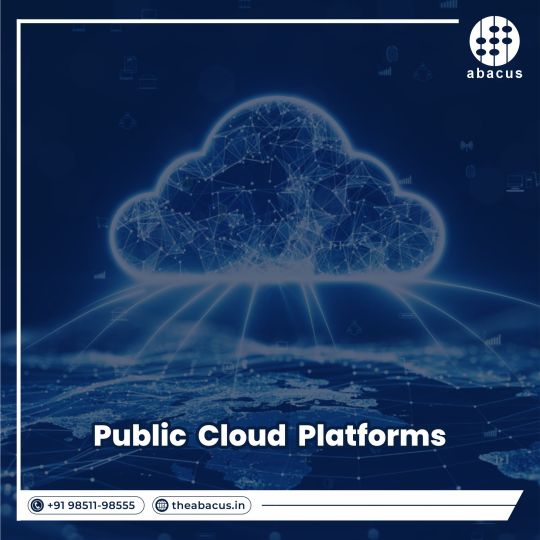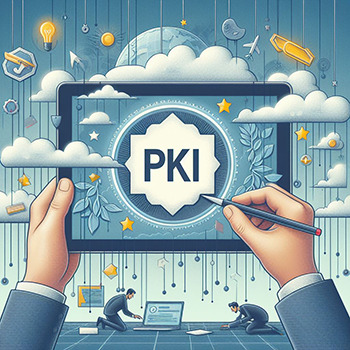#Public Cloud
Text
Navigating Public Cloud Platforms: Maximizing Efficiency and Performance

Discover the optimal strategies for leveraging public cloud platforms efficiently, ensuring peak performance, scalability, and cost-effectiveness. Explore key providers, best practices, and transformative insights for seamless integration and management.
1 note
·
View note
Text
Demystifying Hybrid Cloud: A Comprehensive Guide to Cloud Computing
In the ever-evolving landscape of technology, cloud computing has emerged as a cornerstone of innovation, enabling organizations to streamline operations, enhance scalability, and drive digital transformation. Within the realm of cloud computing, one concept that has gained significant traction is the hybrid cloud model. In this article, we will delve into the intricacies of hybrid cloud, exploring its definition, benefits, challenges, and real-world applications.

Understanding Hybrid Cloud
At its core, hybrid cloud refers to a computing environment that combines elements of public and private clouds, allowing organizations to leverage the strengths of both platforms. In a hybrid cloud setup, specific workloads, applications, or data are seamlessly orchestrated between on-premises infrastructure and public cloud services, such as Amazon Web Services (AWS), Microsoft Azure, or Google Cloud Platform (GCP).
The hybrid cloud model offers unparalleled flexibility, enabling organizations to optimize resource allocation, meet fluctuating demand, and maintain control over sensitive data and critical workloads. By seamlessly integrating private and public cloud environments, businesses can achieve a dynamic and scalable infrastructure that adapts to their evolving needs.
Benefits of Hybrid Cloud
One of the primary advantages of hybrid cloud is its ability to strike a balance between the scalability and cost-effectiveness of public clouds and the security and customization of private clouds. By leveraging a hybrid cloud strategy, organizations can:
Scalability: Hybrid cloud allows businesses to scale their infrastructure seamlessly, leveraging the elastic resources of public clouds during peak demand while maintaining dedicated resources for sensitive workloads.
Cost Optimization: With hybrid cloud, organizations can optimize costs by allocating workloads to the most cost-effective cloud environment based on performance requirements, compliance regulations, and budget constraints.
Data Security and Compliance: Hybrid cloud enables organizations to retain sensitive data on-premises or in a private cloud environment while leveraging the agility and scalability of public clouds for less sensitive workloads. This approach ensures compliance with industry regulations and data protection standards.
Disaster Recovery and Business Continuity: By replicating data and workloads across multiple cloud environments, hybrid cloud enhances resilience and enables efficient disaster recovery and business continuity strategies, minimizing downtime and data loss.
Flexibility and Agility: Hybrid cloud provides organizations with the flexibility to deploy workloads where they best fit, whether on-premises, in a private cloud, or in the public cloud. This agility allows businesses to respond quickly to changing market dynamics and customer demands.
Challenges of Hybrid Cloud
While hybrid cloud offers numerous benefits, it also presents challenges that organizations must address to maximize its potential. Some of the key challenges include:
Complexity: Managing workloads across multiple cloud environments introduces complexity in terms of networking, security, and governance. Organizations need robust management tools and skilled personnel to navigate the complexities of hybrid cloud deployments effectively.
Data Integration and Interoperability: Ensuring seamless data integration and interoperability between on-premises infrastructure and public cloud services can be challenging. Organizations must implement robust data management strategies and integration solutions to facilitate smooth data exchange across environments.
Security and Compliance: Hybrid cloud environments introduce security risks associated with data movement between on-premises and public cloud environments. Organizations must implement stringent security measures, encryption protocols, and access controls to mitigate security threats and ensure compliance with regulatory requirements.
Vendor Lock-In: Depending heavily on a single cloud provider can lead to vendor lock-in, limiting flexibility and hindering migration between cloud environments. Organizations must adopt a multi-cloud strategy and embrace interoperable technologies to avoid vendor lock-in and maintain flexibility.
Cost Management: While hybrid cloud offers cost optimization opportunities, effectively managing costs across multiple cloud environments can be challenging. Organizations must closely monitor resource utilization, optimize workload placement, and leverage cost management tools to control expenses and avoid cost overruns.
Real-World Applications
Hybrid cloud is increasingly being adopted across various industries and use cases, driven by its flexibility, scalability, and cost-effectiveness. Some common real-world applications of hybrid cloud include:
Enterprise IT: Large enterprises often leverage hybrid cloud to modernize legacy IT infrastructure, optimize resource utilization, and facilitate digital transformation initiatives while maintaining control over critical workloads and sensitive data.
E-commerce and Retail: Retailers utilize hybrid cloud to handle seasonal spikes in demand, enhance customer experiences, and streamline e-commerce operations. By leveraging public cloud scalability for web applications and on-premises infrastructure for backend systems, retailers can ensure optimal performance and reliability.
Healthcare: Healthcare organizations leverage hybrid cloud to securely store and analyze sensitive patient data, comply with healthcare regulations such as HIPAA, and enhance collaboration among healthcare professionals. Hybrid cloud enables healthcare providers to deploy healthcare applications and services flexibly while ensuring data privacy and security.
Finance and Banking: Financial institutions utilize hybrid cloud to enhance agility, scalability, and security while complying with stringent regulatory requirements. Hybrid cloud enables banks and financial services firms to modernize legacy systems, deploy innovative fintech solutions, and drive digital innovation while safeguarding customer data and ensuring regulatory compliance.
Manufacturing and Industry 4.0: Manufacturers leverage hybrid cloud to optimize production processes, enhance supply chain visibility, and drive operational efficiency. By combining on-premises infrastructure with cloud-based analytics and IoT platforms, manufacturers can gain real-time insights, improve decision-making, and accelerate innovation in the era of Industry 4.0.
In conclusion, hybrid cloud represents a powerful paradigm shift in cloud computing, offering organizations the flexibility, scalability, and agility to meet the demands of today's digital economy. While hybrid cloud presents challenges, its benefits outweigh the complexities, driving widespread adoption across industries and use cases. By embracing hybrid cloud, organizations can unlock new opportunities for innovation, growth, and competitive advantage in an increasingly interconnected and dynamic world.
#Hybrid cloud#Cloud computing#Public cloud#Private cloud#Scalability#Cost optimization#Data security#Compliance#Disaster recovery#Business continuity#Flexibility#Agility#Complexity#Data integration#Interoperability#Security#Vendor lock-in#Cost management#Real-world applications#Enterprise IT#E-commerce#Retail#Healthcare#Finance#Banking#Manufacturing#Industry 4.0.
0 notes
Text
Microsoft Intune Cloud PKI
Recently, Microsoft introduced the general availability of its new PKI-as-a-service solution called Microsoft Intune Cloud PKI. Cloud PKI allows administrators to issue and manage user and device authentication certificates for Intune-managed endpoints without deploying Active Directory Certificate Services (AD CS) on-premises. Cloud PKI frees administrators from the burdens of deploying and…

View On WordPress
#authentication#Azure#BYOCA#certificate#certificates#Certification Authority#cloud#Cloud PKI#device authentication certificate#InTune#Intune Cloud PKI#issuing CA#issuing certification authority#Microsoft#Microsoft Intune#Microsoft Intune Cloud PKI#PKI#PKI-as-a-Service#public cloud#root CA#root certification authority#SCEP#Simple Certificate Enrollment Protocol#user authentication certificate
0 notes
Text
#cloud#Cloud Repatriation#cloud exit#Cloud Repatriation services#all about Cloud Repatriation#private cloud#public cloud
0 notes
Text

Managing your own servers are costly. Your IT team hates it! Migrate to cloud for cost savings and optimisation. Tell us your requirements without any commitment today! 👇👇👇
#scloud#cloudcomputing#cloudsolutions#cloudtechnology#cloud computing#private cloud services#hybrid cloud#public cloud
1 note
·
View note
Text
Exploring Public Cloud Fundamentals: Unravelling the World of Cloud-Based Solutions
Introduction
In today’s fast-paced digital landscape, businesses are constantly seeking innovative ways to adapt, grow, and stay competitive. One of the most transformative technologies that have reshaped the business world is the adoption of public cloud offerings such as AWS (Amazon Web Services) and Azure (Microsoft’s cloud platform). At PDcloudEX, we are committed to guiding you through the fundamental concepts of public cloud technology, its benefits, and its implications for your business. Join us on this journey to understand the world of unparalleled cloud-based solutions.
#Cloud Technology#Public Cloud#AWS (Amazon Web Services)#Azure (Microsoft's Cloud Platform)#Digital Transformation#Business Innovation#Competitive Advantage#Cloud Services#Cloud Adoption#PDcloudEX#Cloud Solutions#Business Implications#Technology Trends#Cloud Computing#Business Growth
0 notes
Text

Containers as a Service Market : Global Opportunity Analysis and Industry Forecast, 2023-2032
The global containers as a service market was valued at $2.2 billion in 2022, and is projected to reach $20.7 billion by 2032, growing at a CAGR of 25.3% from 2023 to 2032.
Read More: https://www.alliedmarketresearch.com/containers-as-a-service-market-A144549
0 notes
Text
Public Cloud vs. Private Cloud: Know the Difference! Tailor your cloud strategy to your business needs.
1 note
·
View note
Text
Release July 2023
Screwdriver team is pleased to announce our newest release which brings in new features and bug fixes across various components.
New Features
UI
Enable cluster admin to force restrictPR setting
Artifact viewer to support displaying Single Page Applications
Display warnings generated during a build.
Enhanced Template page to display usage stats for individual versions.
Bug Fixes
UI
Continue fixing issues related to ember.js upgrade
API
Fix for duplicate events created during remote join
Fix for a security issue where an attacker can assume admin privileges of a previous SD admin who has given up their Github id. This change is applicable to all supported SCMs (Github, Gitlab and Bitbucket)
Fix authorization checks for Bitbucket SCM integration
Queue Service
Fix for more than one periodic build running at the same time
Internals
Command upload to use streams for improved performance
Compatibility List
In order to have these improvements, you will need these minimum versions:
API - v6.0.34
UI - v1.0.820
Store - v5.0.7
Queue-Service - v3.0.6
Launcher - v6.0.182
Build Cluster Worker - v3.0.3
Contributors
Thanks to the following contributors for making this feature possible:
Alan
Haruka
Ibuki
Keisuke
Kevin
Pritam
Sagar
Yuki
Yuta
Questions and Suggestions
We’d love to hear from you. If you have any questions, please feel free to reach out here. You can also visit us on Github and Slack.
Author
Jithin Emmanuel, Director Of Engineering, Yahoo
0 notes
Text

Private, Public, Hybrid Cloud Consulting Solutions
Transform your cloud strategy with our trusted consulting services. Our team of experts provides customized solutions for private, public & hybrid clouds.
For more: https://www.ibexsystems.net/technology-consulting/private-public-and-hybrid-cloud/
1 note
·
View note
Text
JDS Public Cloud
The cloud is becoming increasingly popular due to the development of technology and the deterioration of assets. Jordan’s top cloud service provider, JDS, implements cloud hosting solutions that satisfy all of a company’s needs. JDS provides public cloud clients with 24/7 access to their team of skilled engineers, who provide proactive architecture advancement and security.
1 note
·
View note
Text
Mastering Certificates with Intune Training Course
I’m excited to announce I’ll present a three-day LIVE online training event covering all things Microsoft Intune and certificates. This training event takes place on the ViaMonstra online academy May 14-16, 2024.
Course Material
This training course comprehensively examines all aspects of delivering certificates using Microsoft Intune, including common deployment scenarios, PKCS and SCEP…

View On WordPress
#Active Directory Certificate Services#AD CS#ADCS#BYOCA#certificate authority#Certification Authority#cloud#Cloud PKI#CloudPKI#education#InTune#learning#MDM#Microsoft Intune#PKI#PKI-as-a-Service#public cloud#training#ViaMonstra
0 notes
Text
0 notes
Text
Know About Cloud Computing Services - SecureTech

Introduction
In today's digital age, cloud computing has become an integral part of the business world. Companies are increasingly turning towards cloud computing services to enhance their operations and increase productivity. San Antonio, with its burgeoning technology sector, has become a hub for cloud computing services. One such company, SecureTech, is offering top-notch cloud computing services in San Antonio. In this article, we will explore the benefits of cloud computing and why SecureTech is the go-to company for businesses in San Antonio.
What is Cloud Computing?
Before delving into the benefits of cloud computing, it is essential to understand what it is. Cloud computing refers to the practice of using a network of remote servers hosted on the internet to store, manage, and process data. In simpler terms, it means using the internet to access software and applications that are not installed on your computer or device.
Benefits of Cloud Computing
There are numerous benefits of using cloud computing services, some of which are:
1. Cost-Effective
One of the primary benefits of cloud computing is its cost-effectiveness. It eliminates the need to invest in expensive hardware and software as everything is hosted on the cloud provider's servers.
2. Scalability
Cloud computing offers unparalleled scalability as businesses can easily scale up or down their operations depending on their requirements. This makes it an ideal solution for businesses with fluctuating workloads.
3. Accessibility
Cloud computing services allow businesses to access their data and applications from anywhere with an internet connection. This means that employees can work from anywhere, which enhances productivity and flexibility.
4. Security
Cloud computing services offer robust security measures to protect data and applications from unauthorized access, theft, or loss. Providers like SecureTech offer top-notch security measures to ensure that their clients' data is always secure.
Visit - https://www.getsecuretech.com/cloud-technologies/
#Cloud migration#Cloud storage#Cloud security#Virtualization#Private cloud#Hybrid cloud#Public cloud#Cloud backup#Disaster recovery#Cloud computing#Multi-cloud#Cloud-based#monitoring#Cloud deployment#Cloud scalability#Cloud performance
0 notes
Text
In today’s fast-paced digital landscape, businesses are constantly seeking innovative ways to adapt, grow, and stay competitive. One of the most transformative technologies that have reshaped the business world is the adoption of public cloud offerings such as AWS (Amazon Web Services) and Azure (Microsoft’s cloud platform). At PDcloudEX, we are committed to guiding you through the fundamental concepts of public cloud technology, its benefits, and its implications for your business. Join us on this journey to understand the world of unparalleled cloud-based solutions.
#Cloud Technology#AWS (Amazon Web Services)#Azure (Microsoft Cloud)#Public Cloud#Digital Transformation#Business Innovation#Competitive Advantage#Cloud Adoption#Cloud Benefits#PDcloudEX#Cloud Solutions#Cloud Services#Technology Trends#Business Growth#Cloud Computing#IT Infrastructure#Cloud Strategy#Cloud Implementation#Cloud Migration#Cloud Consulting
1 note
·
View note